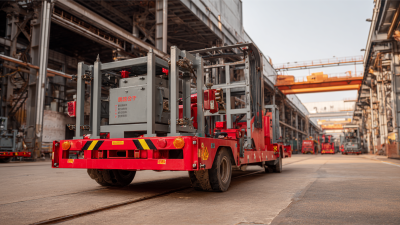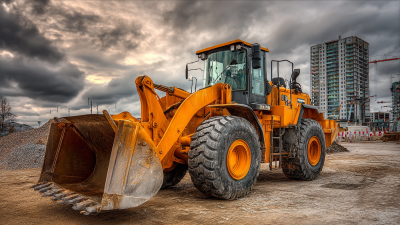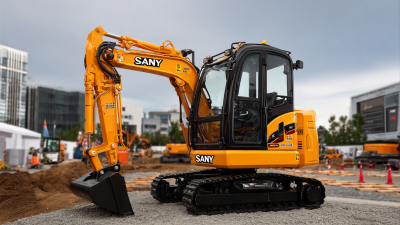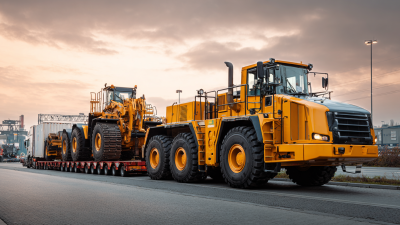Leave Your Message
-
Phone
-
E-mail
-
Whatsapp
The growing integration of Mini Excavators in urban construction projects has sparked significant interest in evaluating their influence on both efficiency and sustainability. According to a report by the Association of Equipment Manufacturers (AEM), the compact construction equipment market is projected to reach $47.70 billion by 2027, with Mini Excavators accounting for a substantial portion of this growth due to their versatility and ease of use in tight urban environments. Mini Excavators, characterized by their small footprint and reduced operational costs, present a compelling alternative to traditional heavy machinery, providing enhanced maneuverability without compromising productivity.

Moreover, their capability to minimize soil disturbance and access confined spaces aligns with sustainable construction practices, as highlighted in a study by the National Institute of Standards and Technology (NIST), which emphasizes the importance of equipment choice in reducing the environmental impact of urban development. This exploration seeks to delve deeper into how Mini Excavators can reshape construction methodologies, balancing the demands of efficiency with the imperatives of sustainability in urban landscapes.
Mini excavators play a pivotal role in enhancing urban construction efficiency due to their compact size and versatility. Unlike traditional larger machines, mini excavators can maneuver easily through tight spaces and confined urban environments, allowing for more precise excavation and site preparation. This leads to a significant reduction in project timelines, as they can quickly adapt to varying tasks such as digging foundations, trenching for utilities, and landscaping. The ability to navigate around existing structures and infrastructure minimizes disruption to surrounding areas and accelerates the overall construction process.
In addition to improving efficiency, mini excavators contribute to urban sustainability efforts. Their smaller engines typically consume less fuel than larger counterparts, resulting in lower greenhouse gas emissions and reduced environmental impact. Many modern mini excavators also come equipped with advanced technology, such as zero-tail swing designs, which further decreases their footprint and enhances safety on crowded job sites. With the growing emphasis on sustainable construction practices, the integration of mini excavators in urban projects not only streamlines operations but also aligns with eco-friendly initiatives, making them an essential asset in contemporary urban development.

Sustainability has become a cornerstone of modern urban construction practices, reflecting a growing recognition of the environmental challenges facing cities today. As urban populations continue to surge, the pressure on natural resources intensifies, making it imperative for construction methods to evolve. Integrating sustainable practices not only minimizes ecological footprints but also enhances the overall quality of urban developments. This involves using materials that are renewable, recycled, or sourced locally, thereby reducing transportation emissions and promoting local economies.
Mini excavators play a crucial role in advancing sustainability within urban construction contexts. Their compact size and fuel efficiency allow for reduced site disturbance and lower emissions compared to larger machinery. In densely populated urban areas, the versatility and agility of mini excavators enable construction teams to navigate tight spaces while adhering to strict environmental regulations. Additionally, their ability to perform tasks like excavation and demolition with precision supports waste reduction efforts and efficient resource management. Thus, the adoption of mini excavators not only streamlines construction processes but also aligns with the broader goals of sustainable urban development.
| Dimension | Factor | Before Mini Excavator Implementation | After Mini Excavator Implementation | Percentage Improvement |
|---|---|---|---|---|
| Construction Time | Project Duration (Days) | 45 | 30 | 33.33% |
| Fuel Consumption | Liters per Week | 250 | 150 | 40% |
| Noise Pollution | Decibel Level | 95 | 85 | 10.53% |
| Waste Generation | Tonnes per Project | 8 | 4 | 50% |
| Site Footprint | Square Meters | 500 | 300 | 40% |
In urban construction, the use of compact machinery like mini excavators offers numerous advantages tailored to densely populated environments. Firstly, their smaller size allows for greater maneuverability in tight spaces where traditional heavy machinery would struggle. This is particularly beneficial in urban settings where streets are often narrow and construction sites are adjacent to existing structures. Mini excavators can easily navigate around obstacles, reducing the risk of damage to surrounding properties and minimizing disruption to traffic flow.

Additionally, mini excavators contribute to sustainability in urban construction by lowering emissions and reducing noise pollution. Many models are designed with eco-friendly engines that comply with stringent regulations, making them suitable for use in populated areas without the worry of exceeding environmental standards. Their efficiency in operation allows for quicker job completion, which not only speeds up project timelines but also lessens the overall environmental footprint associated with construction activities. Compact machinery is, therefore, a vital asset in promoting sustainable growth in urban landscapes while enhancing construction efficiency.
Mini excavators have emerged as a game-changer in urban construction, significantly reducing the environmental impact associated with traditional heavy machinery. According to a recent report from the Building and Construction Authority, mini excavators consume up to 30% less fuel compared to their larger counterparts. This reduction not only lowers operational costs but also minimizes greenhouse gas emissions, contributing to a more sustainable construction approach. With their smaller size and maneuverability, these machines can work in tighter spaces, decreasing the need for site disturbance and preserving existing green areas within urban environments.
Moreover, mini excavators are designed for efficiency and versatility, often equipped with advanced technology that allows for precision digging and minimal soil disruption. A study by the National Association of Home Builders indicates that using mini excavators can reduce soil compaction by up to 50%, promoting better soil health and promoting quicker plant growth in restoration projects. Additionally, their lower noise levels—typically 70% less than larger equipment—help maintain urban tranquility, significantly benefiting surrounding communities during construction activities. Overall, the adoption of mini excavators is essential for enhancing urban construction efficiency while prioritizing sustainability and environmental responsibility.
Investing in mini excavators has become a strategic move for urban construction projects, significantly enhancing efficiency and sustainability. According to industry reports, mini excavators can operate in confined spaces, allowing for more precise work without the need for extensive land clearing, which is crucial in densely populated urban areas. This capability not only minimizes environmental disruption but also leads to faster project completion times, translating to lower labor costs and higher productivity overall.
Furthermore, the return on investment is substantial. Statistics indicate that the mini excavator market is predicted to grow by over 3 times post-2035, driven by increasing market demand for compact and versatile machinery. With their ability to replace larger machines and adapt to various tasks, mini excavators are expected to become essential in urban infrastructure development. Investing early in this technology positions companies to benefit from increased efficiency and reduced operational costs in the long run.
Tips: When considering mini excavators for your projects, assess the specific site requirements and task demands to choose the most suitable model. Keeping maintenance costs low through regular checks can also ensure your equipment remains operational and efficient over its lifespan.






